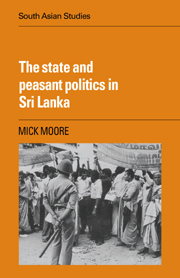Book contents
- Frontmatter
- Contents
- List of maps
- List of tables
- Acknowledgments
- Glossary of Sri Lankan terms
- Maps
- 1 Puzzles and agendas
- 2 Methods, scope and elaborations
- 3 Crown lands
- 4 Land reform
- 5 Pricing and agricultural services
- 6 Categorising space: urban–rural and core–periphery
- 7 A smallholder interest or smallholder interests?
- 8 Rural consciousness
- 9 Ethnic conflict and the politics of the periphery
- 10 The Sri Lankan polity
- 11 Concluding remarks
- Appendix 1 Results of general elections, 1947–77: percentage of parliamentary seats won
- Appendix 2 The myth of the plantation impact on the Sinhalese village: two accounts
- Notes
- Bibliography
- Index
- CAMBRIDGE SOUTH ASIAN STUDIES
- Frontmatter
- Contents
- List of maps
- List of tables
- Acknowledgments
- Glossary of Sri Lankan terms
- Maps
- 1 Puzzles and agendas
- 2 Methods, scope and elaborations
- 3 Crown lands
- 4 Land reform
- 5 Pricing and agricultural services
- 6 Categorising space: urban–rural and core–periphery
- 7 A smallholder interest or smallholder interests?
- 8 Rural consciousness
- 9 Ethnic conflict and the politics of the periphery
- 10 The Sri Lankan polity
- 11 Concluding remarks
- Appendix 1 Results of general elections, 1947–77: percentage of parliamentary seats won
- Appendix 2 The myth of the plantation impact on the Sinhalese village: two accounts
- Notes
- Bibliography
- Index
- CAMBRIDGE SOUTH ASIAN STUDIES
Summary
Introduction
In the late colonial era there were four main categories of larger landowners in Sri Lanka: the state; the plantations; owners of paddy lands leased out in small lots on a sharecropping basis; and, mainly among the Tamil and Muslim populations of the Eastern and Northern Provinces (see Map Two), large rice farmers making extensive use of hired labour. Each of these categories of landowner has been attacked through different policies and in the name of the Sinhalese peasantry. The alienation of Crown lands was the politically least contentious of these assaults because it did not pose any challenge, practical or ideological, to the interests of any major Sri Lankan class or group. In the post-Independence era two sets of land reform legislation have, with varying success, threatened the interests of the last three categories of landowner listed above, and thus the interests of powerful Sri Lankan groups. This legislation has necessarily been politically contentious. Yet the major conclusions of Chapter Three can be shown to continue to hold true. The initiative for this legislation has lain in political conflicts between elements of the political elite, and has owed little to villagers' demands. And the issues have been debated in the context of an accepted interpretation of Sri Lankan history and society which serves to legitimate the concept of an essential unity of Sinhalese interests and to represent the rural core of those interests as a homogeneous ‘peasantry’.
- Type
- Chapter
- Information
- The State and Peasant Politics in Sri Lanka , pp. 50 - 84Publisher: Cambridge University PressPrint publication year: 1985



